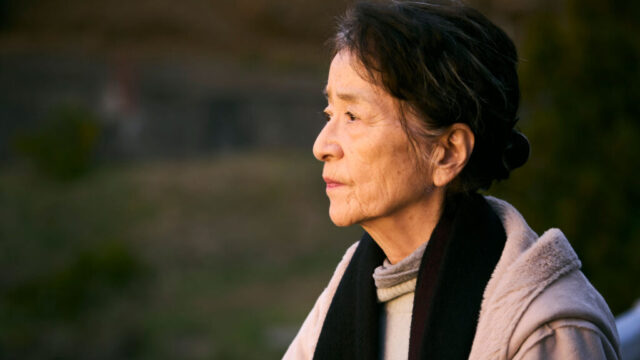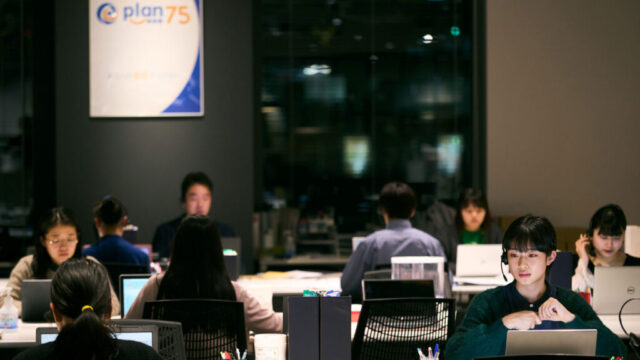
Michi Kakutani (Chieko Baisho) faces the end of her life sooner than she wants to in Plan 75
PLAN 75 (Chie Hayakawa, 2022)
IFC Center
323 Sixth Ave. at West Third St.
Opens Friday, April 21
212-924-7771
www.ifccenter.com
www.kimstim.com
In March 2020, at the beginning of the Covid-19 pandemic, sixty-nine-year-old Texas lt. gov. Dan Patrick told Tucker Carlson on Fox News, “No one reached out to me and said, ‘As a senior citizen, are you willing to take a chance on your survival in exchange for keeping the America that all America loves for your children and grandchildren?’ And if that’s the exchange, I’m all in.” Many people agreed that in order to protect the US economy, it was acceptable to let senior citizens die from the coronavirus.
Japanese writer-director Chie Hayakawa takes that concept to the next level in her debut feature, the melancholic, gorgeously photographed Plan 75, opening April 21 at IFC Center.
Expanded from a short film she made for the 2018 omnibus Ten Years Japan, in which five directors made works set ten years in the future, Plan 75 unfolds in a near dystopia where the Japanese government, in order to combat the inconvenient truth that the population is aging at a potentially unsustainable rate, offers all citizens seventy-five and older the opportunity to be euthanized, no questions asked, in exchange for one thousand dollars and free cremation, among other lures.
“The surplus of seniors is draining Japan’s economy and taking a heavy toll on the young generation,” a young man with a rifle narrates at the beginning of the film. “Surely the elderly don’t wish to be a blight on our lives. The Japanese have a long, proud history of sacrificing themselves to benefit the country. I pray that my courageous act will trigger discussion and a future that’s brighter for this nation.”

Yôko Narimiya (Yumi Kawai) takes a job at a government euthanasia company in Plan 75
Plan 75 evokes elements of Richard Fleischer’s 1973 thriller Soylent Green, in which the government provides extravagantly organized assisted suicide, and Michael Anderson’s 1976 sci-fi flick Logan’s Run, in which citizens are not permitted to live past the age of thirty.
Legendary actress and singer Chieko Baisho is mesmerizing as Michi Kakutani, an elegant seventy-eight-year-old woman with no family. After losing her job as a hotel maid, she tries to find other employment, but it’s difficult at her age. Running out of money, she worries that she might soon be homeless.
She then finds out about the government program called Plan 75; cheerful banners and television commercials are pervasive. Several of her friends, including Ineko (Hisako Ôkata), are interested in the proposition, especially the part that comes with a free stay in a resort. But Michi is not ready to die.
Hiromu Okabe (Hayato Isomura) is a bright and enthusiastic young man who is one of Plan 75’s leading salesmen. He eagerly signs up senior citizens for Plan 75 with a smile on his face, believing it is a good thing for everyone. But when his uncle, Yukio Okabe (Taka Takao), shows up to enroll in the program, he starts having second thoughts.
Meanwhile, fellow employee Yôko Narimiya (Yumi Kawai) is assigned to Michi’s case, quickly growing close with the older woman, which is against the rules. And Maria (Stefanie Arianne) is a Filipino caregiver who has come to Japan to make enough money to pay for her ailing daughter’s heart operation; instead of helping sick and elderly people survive, she is now processing their belongings after they are killed by the state, reminiscent of how the Nazis collected the possessions of victims of the gas chambers.
“Humans have no choice about whether to be born, but it would be a good thing if we were able to choose when it’s time to die,” an elderly woman says happily in a commercial in a Plan 75 waiting room that reverses our usual expectations; instead of waiting to see doctors to keep them healthy, these seniors are waiting to die. “Being able to decide how my life will end provided me peace of mind,” the spokeswoman adds.
Plan 75 is a chilling look at where we might be headed; at times it feels like a documentary, its narrative all too believable. Cinematographer Hideho Urata’s camera ranges from close-ups of Baishô’s face, both celebrating and mourning every deep wrinkle, to dark interiors where the elderly slowly go through their meager daily existence and bright exteriors where children play and trains speed by as Michi can only watch.
At one point, after reading a section of the Plan 75 manual, which purports to give older people the chance to die with dignity, Yôko stares accusingly at the audience, implicating us in this frightening example of elder abuse. Hayakawa and Urata then cut to a sunset peeking through a tree next to a bland housing complex, followed by a shot of Michi’s hand, held up to a fading light through the window, examining each bent and crooked finger as she lies on a futon, wondering if she’s made the right choice — or even was given much of one in the first place.
Winner of a Caméra d’Or Special Distinction at Cannes, Plan 75 is a haunting cautionary tale that speaks volumes as to how senior citizens are treated, or mistreated, whether during a global pandemic or just every day, in Japan or elsewhere, including right here in America, where too many politicians consider them excess baggage. And the stunning finale emphasizes that we need to do something about it, and fast.
Hayakawa (Bird, Niagara) will be at IFC Center opening weekend, participating in Q&As on April 21 at 7:00 with Reiko Tahara, April 22 at 7:10 with Risa Morimoto, and April 23 at 4:25 with Kris Montello.